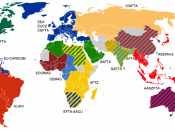Trade Theories and Realities: Why Economists Should Study Fairness
This article describes economic theories of free trade, protectionism, and economic fairness. As well, how will free trade effect workers, consumers, and companies. Public debate between free trade and protectionism focuses on the positive aspects of their position while ignoring the negative aspects. For example, free trade tends to emphasise the opportunities that free trade will be beneficial for exporters and consumers. Opponents of free trade emphasise the threats that open competition with low-wage countries will pose to our import-competing industries. Moreover, they argue that free trade will cause big job losses to already low paid workers in our economy. This article says that free trade is causing a redistribution of income. Some individuals will gain from free trade, while others lose. When barriers to trade will be removed, competition in a product will lower the prices that will stimulate domestic demand for imported goods while reducing demand for domestically produced goods.
To reduce the drop in sales, the local firms will have to lower their prices causing revenues to drop. To reduce costs local factories may reduce employee bonuses and make wage reductions. Since revenues will be down, profits will likely fall as well, affecting the owners and shareholders in the company. As well, it can be positive. When the price of goods and other imported things falls with the reduction in trade barriers, consumers who buy these products will have money left to spend it on other goods in the economy. As the increased demand will continue, the firm will begin to hire new employees so that it can increase its output and profits. Continuously, economic analysis show that trade liberalisation will result in gains in income and well being for some individuals and losses in...


